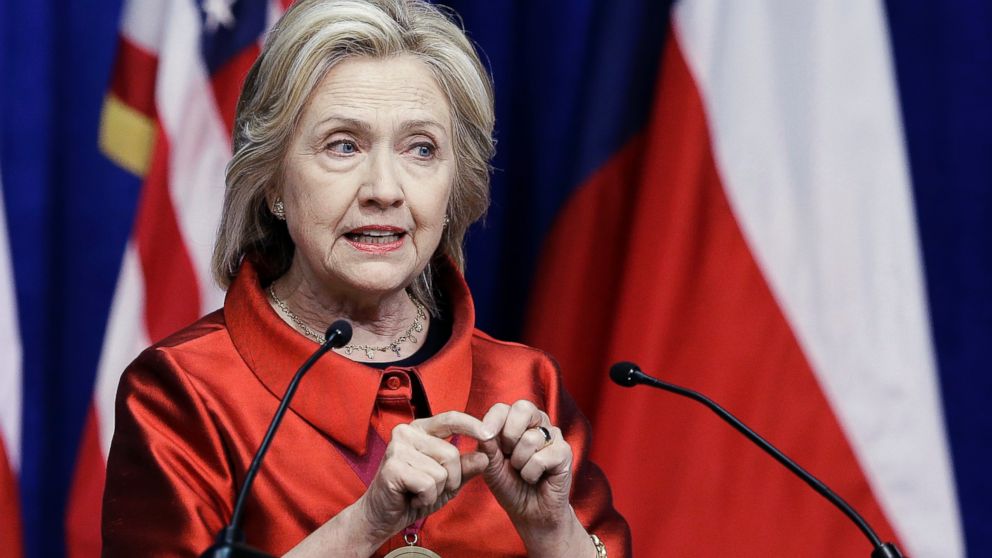Hillary Clinton Blasts Bush, Walker, Christie, Perry For Launching 'Crusade Against Voting Rights'
HOUSTON — -- For the first time since launching her presidential campaign, Hillary Clinton called out some of her likely Republican opponents by name, accusing them of launching a “crusade against voting rights” and for “fear mongering about a phantom epidemic of election fraud” during a speech where she called for universal automatic voter registration for every citizen at the age of 18.
During Clinton’s remarks at a historically black college in Houston, Texas, she condemned laws that she said suppress voting, particularly among minorities and young people and called out GOP lawmakers for “systemically and deliberately trying to stop millions of American citizens from voting.”
“What is happening is a sweeping effort to disempower and disenfranchise people of color, poor people and young people, from one end of our country to another,” Clinton said at the Texas South University, where she was receiving an award in honor of the African-American civil rights activist Barbara Jordan. She mentioned laws that limit early voting and require people provide government-issued IDs to vote.
Republican Name-Dropping
Name dropping Republicans for the first time, Clinton called out four of her likely GOP challengers for enacting measures while in office that she said “undercut this fundamental American principle” of voting.
“Here in Texas, former governor Rick Perry signed a law that a federal court said was actually written with a purpose of discriminating against minority voters,” Clinton said. “He applauded when the Voting Rights Act was gutted. And said the lost protections were out dated and unnecessary.”
“But Governor Perry is hardly alone in his crusade against voting rights,” Clinton added. “In Wisconsin, Governor Scott Walker cut back early voting and signed legislation that would make it harder for college students to vote. In New Jersey, Governor Chris Christie vetoed legislation to extend early voting. And in Florida, when Jeb Bush was governor, state authorities conducted a deeply flawed purge of voters before the presidential election in 2000.”
Republican National Committee spokesman Orlando Watson called Clinton's assertions "misleading and divisive."
"In reality, the vast majority of Americans -- including minority voters --support commonsense measures to prevent voter fraud," Watson said in a statement. "Clinton’s shameless attacks ignore the fact her Democrat-led home state of New York does not allow early voting while dozens of Republican-led states do."
The Backstory
The issue of voting rights has become a point of focus for the Democratic Party since 2013 when the Supreme Court struck down a key provision of the Voting Rights Act of 1965 that invalidated pre-clearance requirements.
Without the provision, which required jurisdictions in states with a history of discrimination to clear voting law changes with the federal government, states have had an easier time passing measurements that many Democrats argue make it harder for Americans –- often minorities and the elderly –- to vote.
These measures include requiring a government-issued photo ID to vote, a proof of citizenship to register and cutting back on early voting. While Republicans say these laws help prevent voter fraud, Democrats argue they prevent people from getting to the polls.
What Clinton Wants To Do
During her remarks Clinton denounced the Supreme Court’s 2013 ruling and condemned more recent efforts to tighten voting requirements, specifically in North Carolina, Texas, New Jersey, Wisconsin, and Florida.
She laid out a multi-pronged approach to addressing her concerns that included calling for automatic voter registration for every citizen in the United States when they turn eighteen, unless they actively choose to opt-out.
Additionally, she called for the expansion of early voting across all 50 states, including a requirement of at least 20 days of open early polling, and opportunities for weekend and evening voting; for updating and modernizing the voter registration system; and urged Congress to take “swift action to restore the Voting Rights Act."
Clinton argued that these changes would reduce long lines at polling stations on election day and expand access to voting.
Rallying An Important Base
The issue of voting rights is one that directly affects an important bloc of Democratic voters whose support Clinton will need: African-Americans.
The crux of Democratic push back against GOP-sponsored voting bills is that they limit access to the polls for minorities, and minority civil-rights groups like the NAACP have spoken out forcefully against state laws as attacks specifically on African-American voting rights.
As reported by The New York Times, a nationwide legal battle has been mounted by Marc Elias, a top Democratic lawyer who represents four of the party’s national campaign committees –- as well as Hillary Clinton’s campaign.




